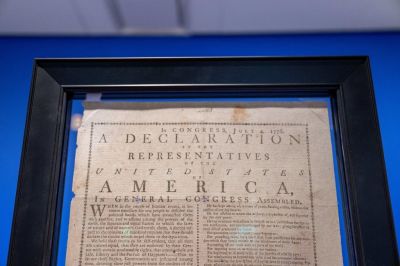
Beginning with the 4th of July celebrations last Friday, Americans commenced a year-long commemoration and celebration in anticipation of our Bisesquicentennial (the 250th anniversary of the Declaration of Independence’s proclamation on July 4, 1776).
My hope and prayer is that Americans across this great country of ours will seize the strategic opportunity to emphasize the universal importance of the American Revolution, which produced unprecedented democratic principles for which America claimed universal application.
In many important ways, America’s Revolution, initiated by the Declaration of Independence, made America the first of a new kind of nation, one based on “the consent of the governed,” making governments accountable to their people.
Sadly, it has become clearer with each passing year that more and more Americans, especially in younger generations, are either unfamiliar with their nation’s important history or have rejected the lasting principles it produced.
Over the next twelve months, this column will periodically discuss one of those American founding principles in the hope of increasing knowledge and appreciation of our heritage and its continuing importance to both our nation and the world.
Today, I want to discuss freedom of religion. The eventual implementation of the founding ideals of the American Revolution was the United States Constitution, with the Bill of Rights attached. The First Amendment constitutionally guarantees the basic human rights essential to true freedom:
Congress shall make no law respecting an establishment of religion, or prohibiting the free exercise thereof, or abridging the freedom of speech or of the press, or the right of the people peaceably to assemble and to petition the Government for a redress of grievances.
One of the major forces driving the adoption of the First Amendment was the fact that the Baptists, who had become one of the largest denominations in America in the wake of the First Great Awakening (circa. 1734-1758), were extremely unhappy with being persecuted and discriminated against by nine of the original thirteen states which had official, state-sponsored denominations (all of which persecuted).
Baptists had grown to the point that if they did not vote to ratify the Constitution, then it would fail ratification. So, John Leland, the most prominent late 18th-century Baptist preacher and evangelist, met with James Madison, a chief architect of the Constitution and America’s fourth president (1809-1817), for several hours in the snow in Orange County, Virginia.
Because of their numbers, the Baptists held the balance of power in Virginia, and if Virginia, the largest and richest early Federal state (four of the first five presidents came from Virginia – Washington, Jefferson, Madison and Monroe) did not ratify the Constitution, it would not succeed.
The Baptists wanted to make certain the new Constitution would not create a national, official, state church like nine of the original thirteen states had in place.
Leland and Madison cut a “political deal,” wherein Leland would convince Baptists to vote for ratification, and Madison guaranteed the first Congress under that new Constitution would adopt an amendment which guaranteed no “establishment of religion, nor prohibiting the free exercise thereof. . .”
This freedom of religion has allowed the flourishing of all types of religion in America like no other nation on the planet. One major reason for this is that religion in
America is personal and voluntary. If people find their religion unsatisfactory, they can change it without fear of retribution. So, American churches, synagogues, temples and mosques are more filled with voluntary worshippers than almost all other countries’ places of worship.
The basis for this “soul liberty” goes all the way back to Roger Williams in the early 17th century. Williams was driven out of the Puritan Massachusetts Bay Colony for opposing the state church and advocating “believers’” baptism as opposed to infant baptism. Williams penned a tract, The Bloody Tenant of Persecution, in which he proclaimed that for any man, even a king, to coercively interfere with another man’s relationship with his God was “soul rape.”
The breadth and depth of Americans’ freedom to worship as they please — or not to worship at all, without legal penalty of any kind — has been a model for the world. It is a freedom far too many Americans take for granted.
Like all freedoms, the best way to honor and defend freedom of religion is to exercise it. My prayer is that during the next twelve months, Americans will exercise their freedom of religion and turn their attention to spiritual perspectives. America can only benefit as more and more of its citizens make a genuine connection with their Creator.
And we should always remember that our forefathers, when they declared their independence from Great Britain, did not declare their independence from God. In fact, they expressly acknowledged their Creator in the Declaration. They declared that men were not born, but “created” equal.
In concluding their truly revolutionary Declaration, they declare: “And for the support of this Declaration, with a firm reliance on the protection of Divine Providence, we mutually pledge to each other our Lives, our Fortunes, and our sacred honor.”
Dr. Richard Land, BA (Princeton, magna cum laude); D.Phil. (Oxford); Th.M (New Orleans Seminary). Dr. Land served as President of Southern Evangelical Seminary from July 2013 until July 2021. Upon his retirement, he was honored as President Emeritus and he continues to serve as an Adjunct Professor of Theology & Ethics. Dr. Land previously served as President of the Southern Baptist Convention’s Ethics & Religious Liberty Commission (1988-2013) where he was also honored as President Emeritus upon his retirement. Dr. Land has also served as an Executive Editor and columnist for The Christian Post since 2011.
Dr. Land explores many timely and critical topics in his daily radio feature, “Bringing Every Thought Captive,” and in his weekly column for CP.

















